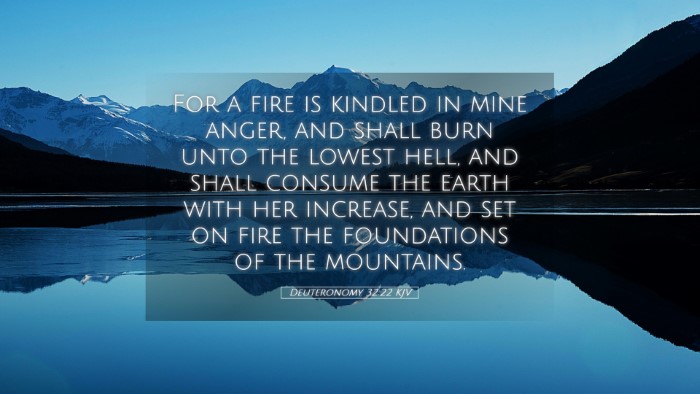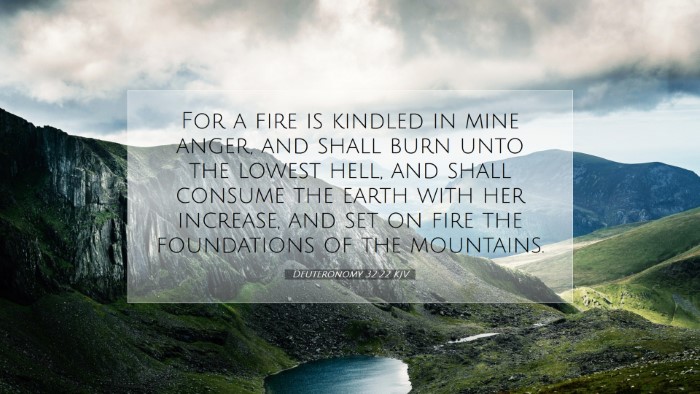Commentary on Deuteronomy 32:22
Verse Text: "For a fire is kindled in mine anger, and shall burn unto the lowest hell, and shall consume the earth with her increase, and set on fire the foundations of the mountains."
Introduction
The passage in Deuteronomy 32:22 is part of the Song of Moses, which serves as both a warning and a proclamation of God’s justice. This verse vividly depicts the intensity of God's anger and serves as a forewarning to the nation of Israel about the consequences of their actions. By combining insights from various public domain commentaries, we can unpack the theological significance, historical context, and moral implications found in this powerful proclamation.
Theological Significance
Divine Anger: The phrase "For a fire is kindled in mine anger" expresses the fierce emotions of God towards sin and rebellion. Matthew Henry notes that the fire symbolizes the severity of divine judgment, emphasizing that God’s anger has a destructive quality, likening it to a consuming fire. Such imagery portrays God's holiness and the necessity of His justice, which cannot overlook sin.
Judgment and Hell: The phrase "lowest hell" indicates the depths of divine judgment. Albert Barnes interprets this to suggest that God’s judgment has a far-reaching effect, extending to the very foundations of the earth and not merely to individuals. This illustrates that when God acts in judgment, it encompasses both spiritual and physical realms, emphasizing that there is no escape from His wrath.
Historical Context
This verse is situated within the historical narrative of Israel as they prepare to enter the Promised Land, reflecting on their past rebellions. Adam Clarke highlights that Moses is reminding the people of God's continual care during their wilderness journey, contrasting it with the consequences of turning away from Him.
- The historical significance of this song is profound as it captures the covenant relationship between God and Israel.
- The Song serves as a testimony against Israel's inevitable disobedience and the resultant consequences.
Imagery of Destruction
The destructiveness described in the latter part of the verse—"shall consume the earth with her increase, and set on fire the foundations of the mountains"—draws attention to the totality of God's judgment. Matthew Henry elaborates on this, emphasizing that no part of creation is exempt from the effects of divine wrath. Both earthly sustenance and the stability of creation (the mountains) are in jeopardy.
Symbolism of Fire
Fire is a multifaceted symbol in Scripture, often representing refinement, punishment, and the presence of God. In this context, it illustrates God’s purifying judgment. Clark notes that fire's ability to destroy is a powerful metaphor for the consequences of sin and rebellion against the divine order. God’s willingness to utilize fire speaks to the seriousness with which he regards unfaithfulness.
Moral and Ethical Implications
This verse serves as a stark warning to those who would disregard God's commandments. The invocation of fire and hell emphasizes that the consequences of turning away from God are dire and ultimately destructive. The notion of accountability is at the forefront of Moses’s message.
- It calls for introspection within the church regarding holiness and obedience.
- Pastors and theologians may use this passage as a basis for sermons on the nature of sin and the importance of divine justice.
Application for Contemporary Readers
As we reflect on Deuteronomy 32:22, it is crucial for modern believers to recognize the active presence of God in the world and the realities of sin. The warning encapsulated in this verse echoes through time, reminding us that God's anger still burns against injustices and unrighteousness. Therefore, believers are called to live in light of His truth.
Encouragement to Faithfulness
The verse, while portraying a grim reality, serves as a reminder of the significance of remaining faithful to God. It calls for vigilance against complacency and the temptation to stray from the path of righteousness. The assurance that our actions have consequences must provoke a response of obedience and dedication to God’s ways.
Conclusion
Deuteronomy 32:22 stands as a powerful declaration of God’s character and a sobering reminder of the seriousness of sin. Through the insights provided by various commentators, we gain a comprehensive understanding of divine anger, the historical relevance of Moses's warnings, and the implications for contemporary faith. May this passage instill a reverent awe of God’s holiness and a renewed commitment to living in obedience to His commands.


